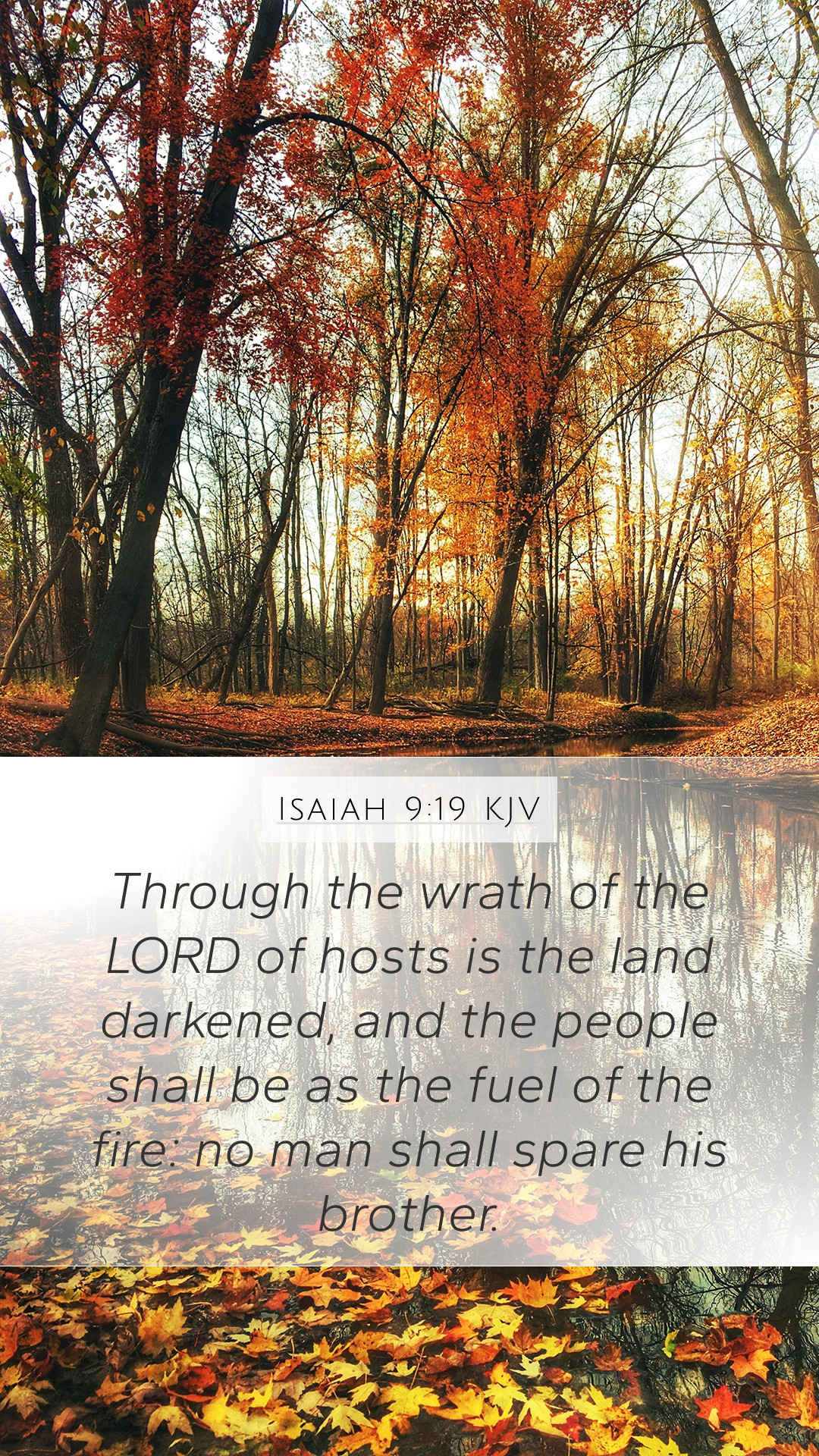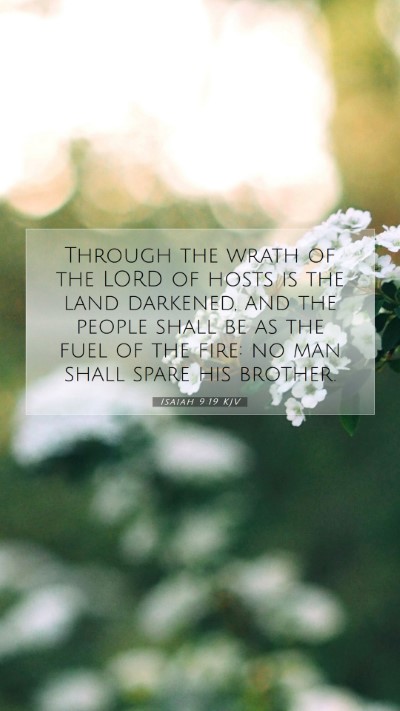Understanding Isaiah 9:19
Isaiah 9:19 states: "Through the wrath of the LORD of hosts is the land darkened, and the people shall be as the fuel of the fire: no man shall spare his brother." This verse expresses the severity of God's judgment due to widespread sin and moral decay. Below is an analysis of the meaning of this Bible verse, incorporating insights from various public domain commentaries to provide a comprehensive understanding.
Bible Verse Meanings
The primary interpretation of Isaiah 9:19 reveals the consequences of God's wrath against unrepentant and wicked behavior. Matthew Henry emphasizes that the darkening of the land signifies spiritual and physical desolation that arises when people turn away from God's light. This verse elucidates that when divine wrath is unleashed, not only is the land affected but the hearts of the people also become hardened, leading them to behave destructively toward one another.
Bible Verse Interpretations
Albert Barnes highlights the imagery presented in this verse, particularly that 'the people shall be as the fuel of the fire,' which illustrates the destructive nature of sin. He interprets this metaphor as emphasizing that the consequences of iniquity eventually lead to self-destruction and a figurative consumption by divine judgment. In a similar vein, Adam Clarke points out that society's moral failures ultimately culminate in collective ruin, with individuals losing empathy for one another amidst societal breakdown.
Key Themes in Isaiah 9:19
- Divine Judgment: The verse emphasizes God's righteous anger against sin.
- Desolation: Stresses the desolation that sin brings upon a community.
- Societal Breakdown: Reflects how sin leads to a loss of compassion among people.
Bible Verse Understanding
In understanding Isaiah 9:19, one must consider the historical context in which Isaiah prophesied. This was a time of great moral decline in Israel, where the people had turned away from the teachings of God. Matthew Henry explains that the rampant immorality and idolatry among the Israelites prompted God’s decisive response. The wrath expressed in this verse serves not only as a warning to that generation but also as a lesson for readers throughout history regarding the consequences of disregarding divine commandments.
Bible Verse Explanations
Examining the verse further, we see that the phrase "no man shall spare his brother" reflects a profound moral degradation where individuals are incapable of showing kindness or aid to one another. This lack of compassion is indicative of a society that is under judgment. Adam Clarke's commentary on this point adds depth by indicating that this mutual disregard stems from a fear and desperation instigated by dire circumstances, where survival instincts override communal ties.
Additional Insights
- Spiritual Darkness: The darkness referenced indicates not only physical darkness but a moral and spiritual blindness prevalent in the society.
- Community Relations: It foreshadows how sin can fracture human relationships and community bonds.
- Calls for Repentance: Implicit within this message is a call for repentance to avert such a tragedy.
Cross References
Isaiah 9:19 relates closely to several other scripture passages that depict themes of divine judgment and societal decay:
- Isaiah 1:18-20: Discusses God's call for repentance and the consequences of disobedience.
- Jeremiah 7:19-21: Explores the repercussions of idolatry and disobedience among the people.
- Matthew 24:12: Jesus speaks about the increase of wickedness leading to the cooling of love among many.
Application of Bible Verse in Life
For personal application, Isaiah 9:19 serves as a reminder of the importance of maintaining spiritual vigilance and communal compassion. As individuals study this verse, they can reflect on their own lives and consider how societal trends may lead to moral decay and the necessity for upholding God's principles in daily living. Engaging in Bible study groups and discussions focusing on such themes can help reinforce these lessons for practical application.
Conclusion
In summary, Isaiah 9:19 portrays the grim realities of divine judgment while offering profound insights into human nature and societal dynamics. Through the comprehensive analysis provided by commentators like Matthew Henry, Albert Barnes, and Adam Clarke, readers gain a more nuanced understanding of the Scriptures, alongside the vital importance of aligning oneself with God's will to counteract the darkness that can engulf a community.


